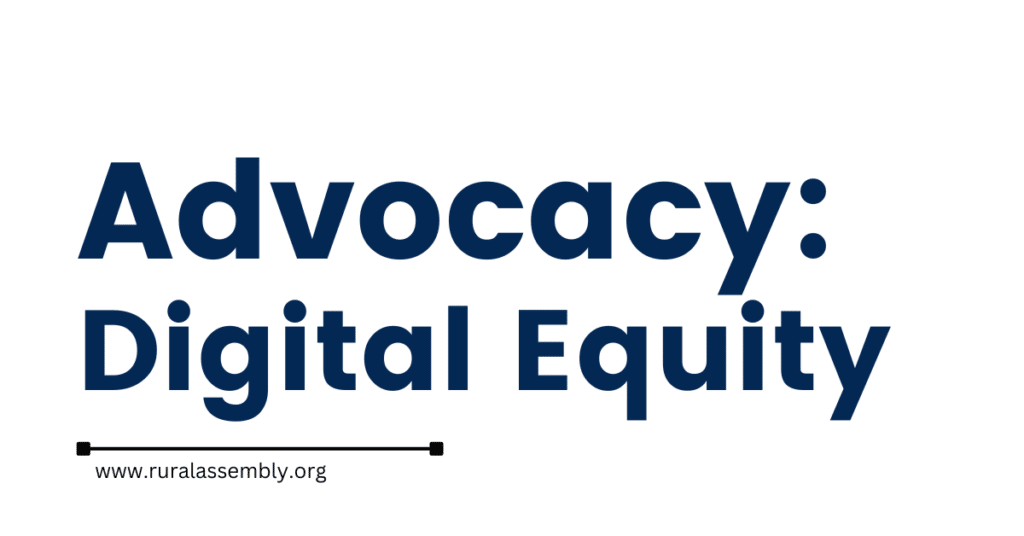Advocacy: Digital Equity Foundation Act and rural communities

This post first appeared in our Advocacy newsletter. Here’s how to subscribe.
Legislation to establish the Digital Equity Foundation Act was reintroduced in Congress last week. The Center for Rural Strategies, the parent organization of the Rural Assembly, is among several groups endorsing the legislation, which was first introduced last year.
Learn more about why this could make a difference for rural communities.
What it is: The legislation aims to “establish a nonprofit foundation that would channel public and private investments into making progress in closing the divide on digital equity, digital inclusion, and digital literacy.
Why it matters: According to Airwaves for Equity, more than 1 in 5 Americans still lack broadband internet at home, including millions with access who have not adopted it. If people don’t know how to use technology, or cannot tap its value for their most basic needs, our efforts to connect them are fruitless. In rural communities, the need for broadband internet is great.
“Investments in infrastructure that seek to make broadband affordable and accessible in rural communities are not enough alone. The Digital Equity Foundation Act would provide ongoing and necessary support for rural families as technology shifts and changes and as the economy and services move online,” said Whitney Kimball Coe, vice president of National Programs for the Center for Rural Strategies and director of the Rural Assembly.
How it would work: This Foundation will supplement the National Telecommunications and Information Administration (NTIA) and the Federal Communication Commission’s (FCC) work to award grants, support research, provide training and education, engage with stakeholders, collect data, and promote policies to improve digital equity outcomes. The Foundation will be run by a Board of experts specializing in the fields of digital equity, technology, and telecommunications, and will represent diverse communities throughout the U.S.
Is there a track record for this kind of effort? Congressionally-established nonprofit foundations have had great success in supporting the missions of various government agencies, including the National Institutions of Health (NIH), U.S. Food and Drug Administration (FDA), and the National Park Service (NPS), and provide a mechanism to leverage public-private partnerships and support innovation.
As the NTIA works to implement the broadband programs in the Infrastructure Investment and Jobs Act (IIJA) and connect our country, the Digital Equity Foundation will be vital to ensuring the most vulnerable communities have the knowledge and skills to take full advantage of these new connections.
Who’s behind it: The bill was reintroduced by U.S. Senator Ben Ray Luján (D-N.M.) and U.S. Representative Doris Matsui (D-Calif.) led U.S. Senators Dianne Feinstein (D-Calif.), Amy Klobuchar (D-Minn.), Richard Blumenthal (D-Conn.), Martin Heinrich (D-N.M.), Ed Markey (D-Mass.), Jeff Merkley (D-Ore.), and Dick Durbin (D-Ill.)
The legislation is endorsed by the Open Technology Institute at New America, Public Knowledge, The Schools, Health & Libraries Broadband (SHLB) Coalition, the Center for Rural Strategies, the PtP Initiative, the National Hispanic Media Coalition, Common Sense Media, Consumer Reports, the American Library Association, the National Digital Inclusion Alliance, Common Cause, the United Church of Christ Media Justice Ministry, the National Consumer Law Center, and NextGen California.
The legislation calls for the Foundation to have at least one rural and one Indigenous member of its governing board.
What can I do?: Endorse the bill at Airwaves For Equity
Learn more:
Announcement from U.S. Senator Ben Ray Luján (D-N.M.) and U.S. Representative Doris Matsui (D-Calif.)
This post first appeared in our Advocacy newsletter. Here’s how to subscribe.







